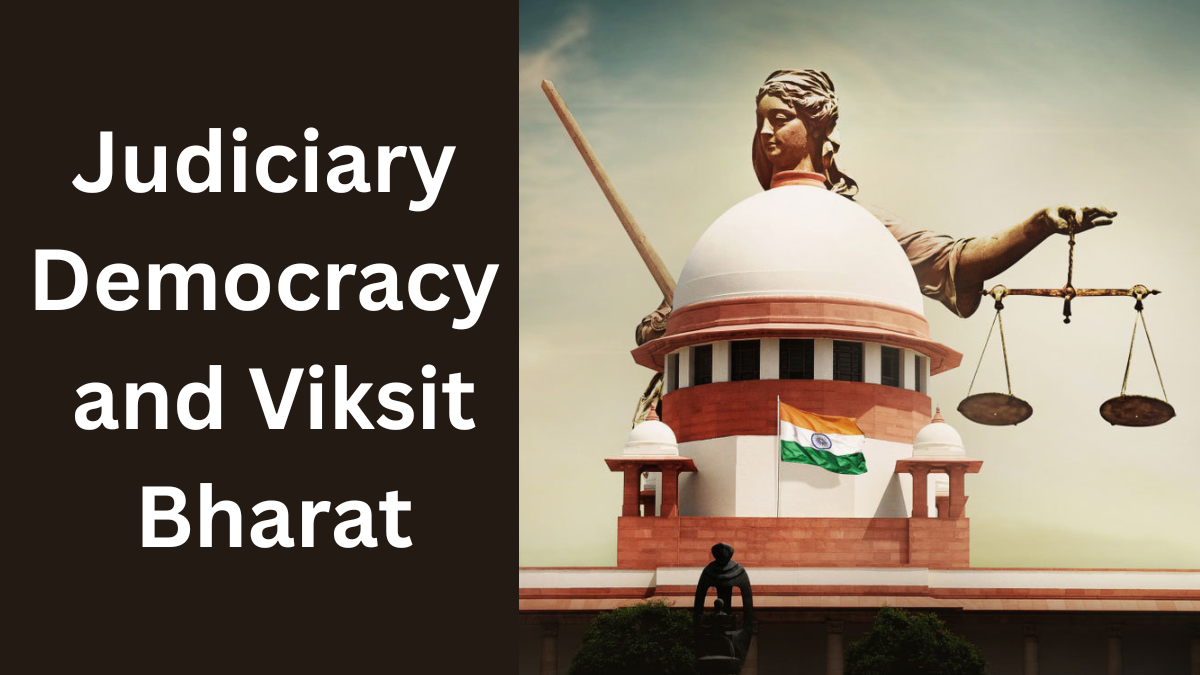In the midst of rising political rhetoric and legal disputes, the Indian government has come forward to clarify its unwavering stance on judicial respect. Amid intense scrutiny, top government sources have underlined that all democratic pillars, including the judiciary and legislature, are working hand in hand towards the vision of a Viksit Bharat (Developed India).

“Respect for the Judiciary Is Paramount”: Government’s Key Message
Following public criticism from a few political figures—including Vice President Jagdeep Dhankhar—towards the Supreme Court, the Centre issued a clear statement through high-ranking sources:
“Respect for the judiciary is paramount. All pillars of democracy are working in tandem for a Viksit Bharat. The judiciary and the legislature are two sides of the same coin.”
This reassurance seems like a strategic balancing act to calm tensions, particularly after the Supreme Court flagged parts of the Waqf Amendment Act, which triggered nationwide protests.
Waqf Act Controversy: What’s Happening?
The Supreme Court recently questioned certain provisions in the Waqf Amendment Act. In response:
-
The Centre paused some of the contested provisions.
-
It assured that all Waqf-related petitions will be addressed through proper legal channels.
“Everyone has the right to knock on the doors of the Supreme Court. The Union of India will present its side,” said a government insider.
Tensions Rise: Vice President vs. Supreme Court
Vice President Dhankhar didn’t mince words while questioning the top court’s Tamil Nadu judgment. The ruling essentially required the President and Governors to act within a set timeframe when clearing state legislature Bills—something Dhankhar saw as judicial overreach.
He stated:
“Article 142 has become a nuclear missile against democratic forces, available to the judiciary 24×7.”
He emphasized that:
-
Parliament is supreme
-
Elected representatives define constitutional values—not the judiciary
What Was the Tamil Nadu Verdict All About?
The Supreme Court had ruled:
-
Courts have exclusive jurisdiction in constitutional matters.
-
The Executive should show restraint, especially while dealing with legislation passed by the state assembly.
Key Voices in the Judiciary and Politics
| Name | Position | Statement/Role |
|---|---|---|
| Justice Surya Kant | SC Judge | “Judiciary faces daily attacks. We are not worried.” |
| Justice BR Gavai | Incoming CJI | Repeated concerns over allegations of overreach |
| VP Jagdeep Dhankhar | Vice President | Criticized SC for Article 142 use |
| MP Nishikant Dubey | BJP MP | Criticized SC for deadline on Governors |
| Dinesh Sharma | BJP Leader | Asserted that the President’s authority can’t be challenged |
| Government Sources | Anonymous | Reiterated judiciary-legislature harmony |
BJP Leadership Responds: Distancing Itself
After backlash from various quarters, the BJP distanced itself from controversial remarks made by its own MPs.
-
“These are personal statements.”
-
“BJP does not support or agree with such views.”
-
“We fully respect the judiciary.”
This damage control appears aimed at defusing the growing perception of institutional friction between the government and the courts.
Opposition Reacts: Allegations of Judicial Intimidation
The Opposition parties accused the ruling party of:
-
Undermining the judiciary
-
Threatening institutional independence
-
Politicizing constitutional interpretation
What Does the Judiciary Say?
Justice Surya Kant addressed the ongoing criticism during a contempt of court hearing. A lawyer raised concerns about defamatory reporting and public attacks on judges. But Justice Kant remained unfazed:
“We are not worried about the institution. We’ll continue our work.”
FAQs
1. Why is the Waqf Amendment Act controversial?
The Act was flagged by the Supreme Court due to concerns over specific provisions that could potentially impact property rights and communal harmony. The Centre has now paused parts of the Act and pledged to address petitions legally.
2. What did the Supreme Court rule in the Tamil Nadu case?
The top court ruled that the President and Governors must act within a reasonable timeframe when reconsidering Bills passed by a state legislature. It also emphasized that only courts can interpret constitutional matters.
3. Why did Vice President Dhankhar criticize the judiciary?
He believed that the Supreme Court’s Tamil Nadu judgment infringes on the autonomy of the Parliament and the role of elected representatives, calling the use of Article 142 an overreach.
4. Did the BJP support the remarks made by its MPs?
No. The BJP officially distanced itself from comments made by MPs Nishikant Dubey and Dinesh Sharma, calling them “personal views” and reaffirming the party’s respect for the judiciary.
Click here to learn more
Pari is a passionate writer known for captivating stories that blend imagination and reality. Inspired by travel, history, and everyday moments, Pari crafts narratives that resonate deeply with readers.